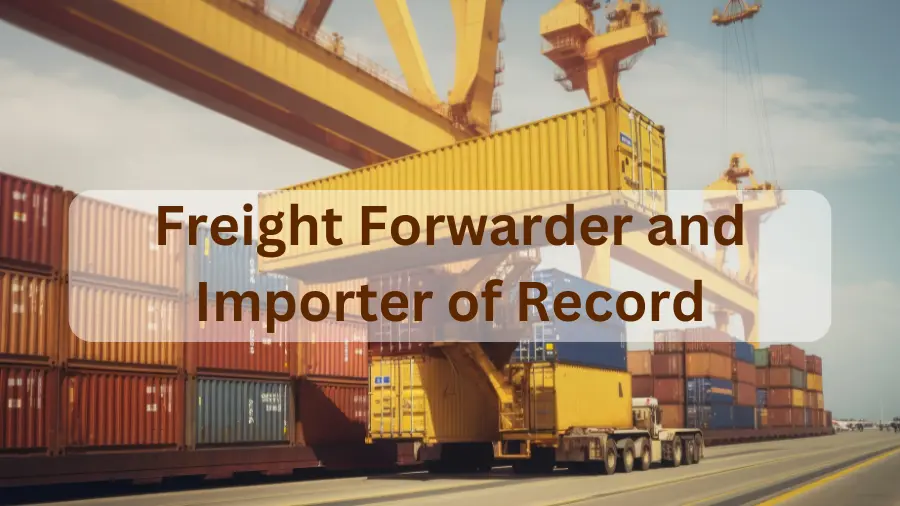Shipping goods internationally involves two major roles: moving shipments across borders and ensuring they are legally compliant. This often leads to a key question: can a freight forwarder also act as the Importer of Record (IOR)?
The answer is: sometimes yes, but not always. To understand when it works—and when it doesn’t—let’s look at the differences.
Can a Freight Forwarder Act as The Importer of Record?
A freight forwarder can be the Importer of Record, but not all freight forwarders offer this service. They must have all necessary licenses and permits to handle the legal responsibilities and regulations. If your freight forwarder does not provide IOR services, you may need to work with a customs broker or IOR service provider to ensure compliance.
Difference Between Importer of Record vs. Freight Forwarder
To understand whether a freight forwarder can be an importer of record, let’s first clarify their roles. Here’s a breakdown of their responsibilities and key differences:
| Aspect | Importer of Record (IOR) | Freight Forwarder |
|---|---|---|
| Responsibility | Legally accountable for customs compliance, duties, and taxes. | Coordinates transportation and logistics. |
| Ownership of Goods | May or may not temporarily take ownership for customs purposes. | Never owns the goods; acts as a coordinator. |
| Legal Role | Must comply with local import laws and regulations. | Manages shipping schedules, carriers, and delivery. |
| Documentation | Handles import permits, licenses, and customs clearance. | Prepares bills of lading, airway bills, and shipping docs. |
| Risk | Assumes legal liability, including fines for non-compliance. | No legal liability—risk is limited to shipment delays. |
When Can a Freight Forwarder Act as IOR?
Some freight forwarders extend their services to include IOR, but this requires:
-
Local business registration in the destination country.
-
All necessary import licenses and permits.
-
Capacity to assume legal liability for customs compliance.
In regulated industries—such as IT, telecom, or medical equipment—a freight forwarder alone is rarely sufficient. Specialized IOR providers are required to handle approvals (e.g., telecom authority clearance, encryption permits, or health certifications).
Does the Importer of Record Own the Goods?
Not usually. The IOR doesn’t purchase or own your shipment. Instead, they assume responsibility for legal compliance during customs clearance. Ownership typically stays with the buyer or seller.
Can the Shipper Be the Importer of Record?
If the shipper is registered in the importing country and can meet local requirements.
However, for cross-border shipments where regulations are strict, businesses often appoint a dedicated IOR service provider to simplify the process.
Simplify Your Imports With IOR Africa
Freight forwarders excel at logistics. Importers of record ensure compliance. Both roles are vital—but rarely interchangeable.
If you operate in industries with strict regulations (IT, telecom, high-tech, medical), relying only on a freight forwarder puts your supply chain at risk. Partnering with a trusted IOR provider ensures your goods clear customs smoothly and legally.
Frequently Asked Questions
Is it essential to deem expenditure when appointing IOR and freight forwarder?
It is essential to deem expenditures when appointing IOR and freight forwarders because the IOR is responsible for ensuring compliance with regulations, which often require specialized expertise and may include additional fees.
On the other hand, freight forwarders handle the transportation of goods, and their charges can vary based on factors such as shipment size and the chosen transportation method, like air or sea freight. Considering the expenses for both parties upfront helps you avoid surprises and ensures a smooth and hassle-free import process.
Who is the importer of record on a FOB shipment?
The Importer of Record (IOR) on a Free On Board (FOB) shipment is typically the buyer or consignee. In FOB terms, the seller’s responsibility ends once the goods are loaded on the ship. After that, the buyer is responsible for the goods, including customs clearance, duty payment, and compliance with import regulations.
Can the freight forwarder issue a bill of lading?
A freight forwarder can issue a bill of lading, specifically a House Bill of Lading (HBL). This document is a receipt for the cargo, a contract for its transportation, and can also work as a title to the goods. The HBL is issued by the freight forwarder to the shipper, detailing the terms and conditions of the shipment.

